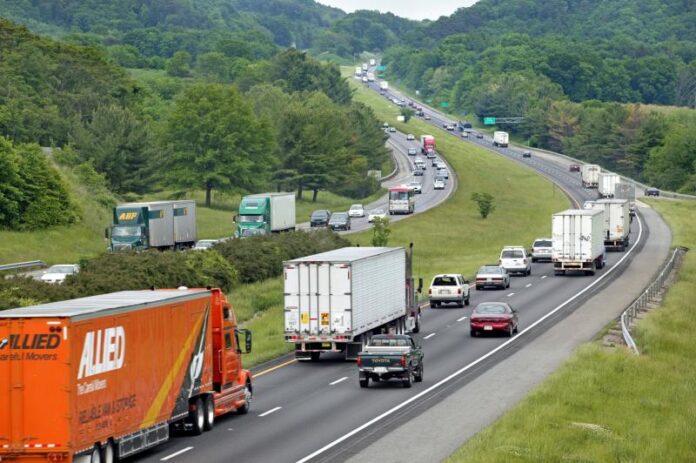 Interstate 81’s heart pumps through rural Virginia with veins that run from Tennessee to the Canadian border — a vital roadway for manufacturers, farmers and commuters.
Interstate 81’s heart pumps through rural Virginia with veins that run from Tennessee to the Canadian border — a vital roadway for manufacturers, farmers and commuters.
With a long track record of crashes and congestion, Virginians looked to legislators for solutions to improving the interstate. But Sen. John Edwards, D-Roanoke, said the General Assembly passed only “a shell of a bill.”
At the beginning of the session, Gov. Ralph Northam met with legislators to announce bipartisan support for finding a revenue source for improvements to Virginia’s 325-mile stretch of I-81, which accounts for 42 percent of statewide interstate truck traffic.
“Making these improvements will take money. Finding money requires tough choices,” Northam said.
Legislators ended their session Sunday without finding the money. So Virginians will have to wait another year before seeing a plan to pay for improvements to the highway.
In December, the Commonwealth Transportation Board released a study that identified $4 billion in construction needs for I-81, including $2.2 billion in priority projects. Officials floated various ideas, from taxes to tolls, to finance the improvements.
As the General Assembly convened in January, lawmakers filed six bills seeking to address the problem. They included HB 2718, sponsored by Del. Steven Landes, R-Augusta, and SB 1716, introduced by Sen. Mark Obenshain, R-Rockingham. Those bills sought to impose tolls on I-81, with the revenues designated for improvements on the interstate.
The House and Senate each passed different versions of the measures. When a conference committee met to resolve the differences, legislators switched gears and approved the twin bills without a drop of funding for the interstate improvements.
The legislation was reworked to remove any language about tolls. Instead, the bills would simply create an Interstate 81 Corridor Improvement Transportation Committee and an unfunded Interstate 81 Corridor Improvement Fund.
“The Committee shall conduct regional public meetings on options for funding and improvements” and offer recommendations to the governor and the General Assembly by Dec. 15, the legislation states.
Stephanie Kane, communications director of the Alliance for Toll-Free Interstates, said the bills were changed because of the public outcry against tolls. She said tolls are harmful to commuters and threaten economic development by forcing businesses to increase prices.
“Tolls can be a politically convenient way to raise taxes without having to vote for that three-letter word,” Kane said. “The I-81 Corridor Improvement Fund just creates the existence of the fund, but it’s like creating the bank account without the money to go in it — there’s no revenue source.”
In late 2018, the polling firm Public Opinions Strategies conducted a survey of 500 residents in the I-81 corridor. Eighty-eight percent of the respondents supported a $2 billion plan for improvements needed on the stretch of I-81 that state officials have designated a high priority. Those improvements would include a third lane and signage to deter congestion.
Sens. Edwards and Emmett Hanger, R-Augusta, proposed raising the motor fuels tax to fund transportation improvements statewide and especially on I-81. The bill passed the Senate but died in the House of Delegates.
Edwards said the measure seemed to have bipartisan support at first, but some lawmakers backpedaled because all legislative seats are up for election in November.
“My impression was that there was pressure from leadership in the House. The House leadership says, ‘We can’t have a tax this year because that’s wrong — it’s an election year,’” Edwards said. “It’s nice to have a fund on paper, but with no money, you can’t do anything with it. It’s just a shell of a bill.”
By Kathleen Shaw / Capital News Service


